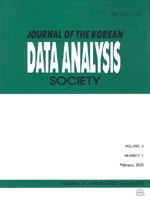The Relationship between Capital Buffer and Contemporarily Financial Policy under Economic Condition: Evidence from Korean Credit Card Firms
- 한국자료분석학회
- Journal of The Korean Data Analysis Society (JKDAS)
- Vol.15 No.6
-
2013.122937 - 2947 (11 pages)
- 2

This study examines the relationship between capital buffer of Korean credit card firms and financial policy under economic condition such as business cycle and financial market situation. The main focus of this study is to review whether Korean credit card firms can meet the capital buffer requirement pursuing by supervisory authorities under regulation for leverage and fee limitations in terms of precautionary motivation perspectives. According to the analysis results, first, business cycle did have positively significant influence on capital buffer. Thus, the pro-cyclicality of capital buffer to business cycle exists in Korean credit card firms. Second, market rate and foreign exchange rate have significantly impact on capital buffer. Due to increasing the cost of capital for credit card firms, the relationship between capital buffer and market rate or foreign exchange rate is negative. Specifically, higher interest rates and weaker Korean currency reduce the amount of capital buffer. Third, leverage limit of supervisory authorities leads to increased capital buffer as suggested by Milne, Whalley (2001). However, it is found that tight fee regulation does not contribute to increasing capital buffer. As the policy implication, stronger leverage limit of supervisory authorities results in making the Korean credit card firms reserve up more capital buffer.
1. Introduction
2. Previous studies and test hypotheses
3. Data and methodology
4. Analysis results
5. Conclusion
References
(0)
(0)